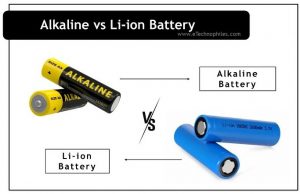Last updated on April 5th, 2024 at 01:03 pm
Alkaline batteries are the highest sold batteries among primary batteries and lithium batteries are the most popular among secondary batteries. While alkaline batteries are used in consumer electronics, lithium-ion batteries are mainly used in the industrial field as well as in gadgets and devices.
Both these battery technologies are not usually replaced with each other due to the difference in their chemistry and performance. Although alkaline batteries are also available in rechargeable versions, they too are used in consumer electronics. Let’s see the prominent differences between these batteries in this article.
Note: There is no comparison between a rechargeable Alkaline and Lithium-ion battery because the former can be recharged only 20-30 times while the latter can go up to 500 charge cycles.
Which battery is better alkaline or lithium-ion?
There are several differences between these batteries. Alkaline batteries are the most common type in the market. They’re inexpensive and have a long shelf life. Lithium-ion batteries are newer, but they boast several advantages over alkaline batteries.
Lithium-ion batteries are typically lighter and smaller than alkaline batteries, making them more portable. They also have a higher energy density, meaning that they can store more energy in a given space.
In addition, Li-ion batteries are rechargeable, while most alkaline batteries are not. Finally, lithium-ion batteries tend to be more expensive than alkaline batteries. However, they also have a longer lifespan, making them a more cost-effective option in the long run.
These factors should be considered when choosing between lithium-ion and alkaline batteries for a particular application.
Table of Contents
Lithium-ion vs Alkaline battery
A comprehensive comparison between the two is given in the table below.
| S.No | Features | Alkaline Battery | Li-ion Battery |
|---|---|---|---|
| 1 | Battery technology | Primary, Secondary | Secondary |
| 2 | Chemical composition | Zn, MnO2, KOH | Li metal |
| 3 | Capacity | 2500mAh | 3842mAh |
| 4 | Shelf life | 5-10 years | 2-3 years |
| 5 | Cycle durability | 200 | 500 |
| 6 | Energy density | 100 Wh/kg | 160 Wh/kg |
| 7 | Weight | Bulky | Light Weight |
| 8 | Operational temperature range | -18°C to +50°C | 10°C to +55°C |
| 9 | Cost | Cheap | Costly |
| 10 | Disposal | No harmful matter, easy to dispose | Disposed of separately, usually recycled |
| 11 | Safety | Safe to handle | Chances to catch fire due to thermal runaway |
| 12 | Applications | Domestic – eg: remote control, toys, etc. | Industrial – eg: electric vehicles, solar power batteries, etc. |
Now let’s discuss them in detail.
Chemical composition
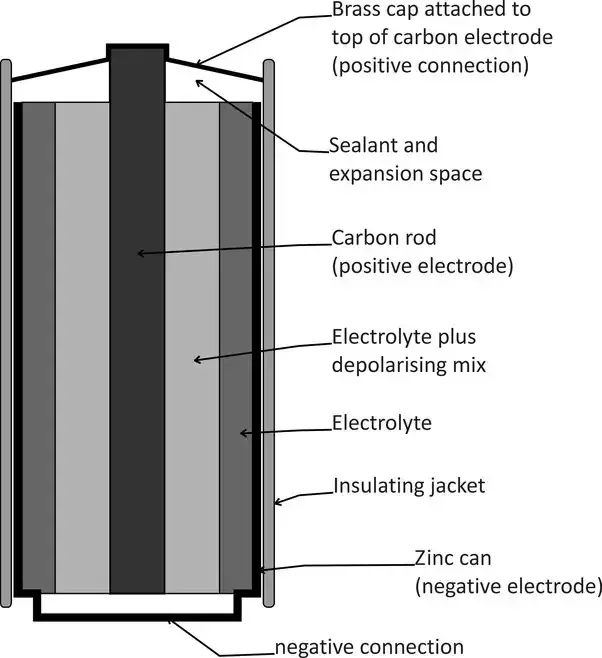
Alkaline batteries consist of zinc and manganese dioxide as cathode and anode. It uses potassium hydroxide as the electrolyte.
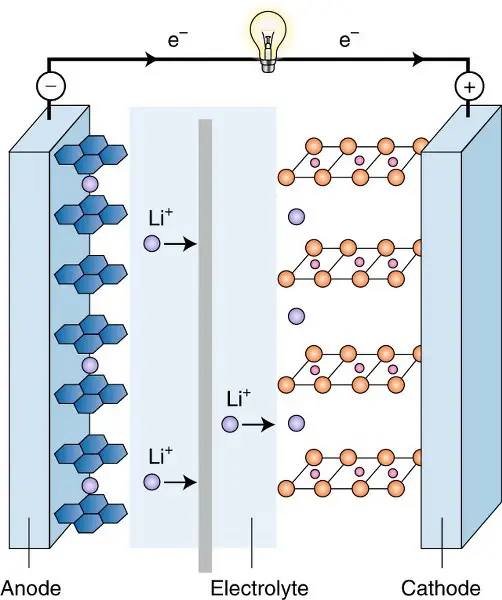
The major composition of lithium-ion batteries is lithium metal. The cathode is lithium cobalt oxide and the anode is lithium dropped with graphite. An organic compound with lithium ions is used as the electrolyte.
Battery capacity
The maximum energy delivered by the battery is termed battery capacity. Lithium-ion batteries show higher capacity than alkaline batteries under specific temperature conditions. The maximum capacity of alkaline batteries is 2500mAh whereas that of Li-ion batteries is 3842mAh.
Which battery has a better shelf life?
Alkaline batteries are well known for their shelf life(kept unused). The alkaline batteries have a shelf life of 5 – 10 years while the shelf life of lithium-ion batteries is 2-3 years. However Li-ion batteries are capable of providing strong discharge throughout their life, whereas the capability of alkaline batteries reduces through their lifetime.
Which battery lasts longer lithium-ion or alkaline?
In general, lithium-ion batteries have a longer lifespan than alkaline batteries. This is because lithium-ion batteries are designed to be recharged, while alkaline batteries are not. When properly cared for, a Li-ion battery can be used for 300 to 500 charge cycles.
On the other hand, even a rechargeable alkaline battery will only last for a handful of discharge/recharge cycles before it needs to be replaced.
Energy density
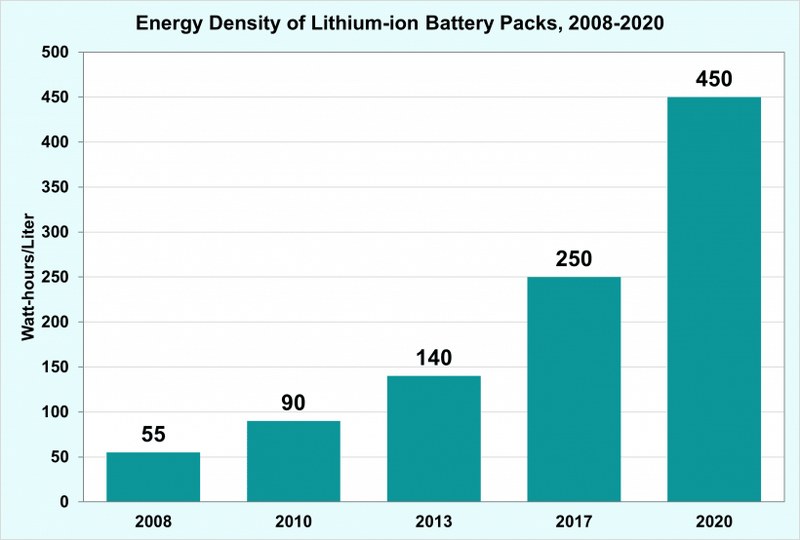
Energy density is considered an important parameter for every battery technology. It is the energy carried by the battery relative to its weight. Lithium is a highly dense metal. It is also a lightweight metal.
Thus lithium-ion batteries show a high energy density which is about 160 Wh/kg. The energy density of alkaline batteries is approximately 100Wh/kg.
Weight – alkaline vs lithium-ion
Battery weight is an important factor of concern when they are used in some applications. Some applications like the automobile sector prefer lightweight batteries. Hence electric vehicles are powered by lithium-ion batteries.
Alkaline batteries of the same capacity are bulkier than lithium-ion batteries. Thus lithium-ion batteries are now replacing the other batteries in portable devices.
Operational temperature range
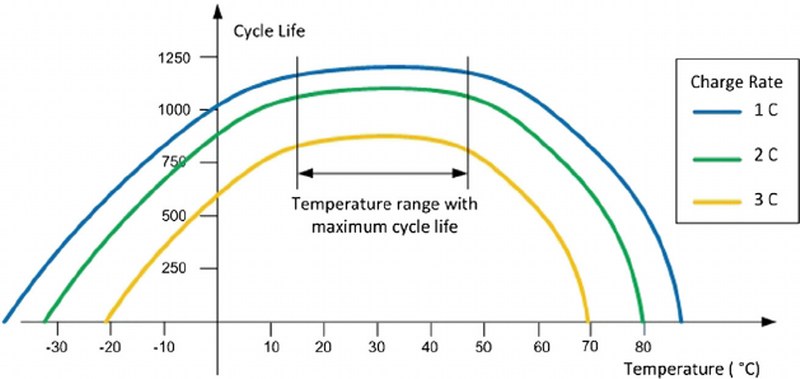
Both lithium-ion and alkaline batteries support a good operational temperature range. Alkaline batteries perform well in the temperature range of -18°C to +50°C and lithium-ion batteries, it is 10°C to +55°C. Both the battery technologies are capable to withstand extreme hot as well as extremely cold temperatures.
Which battery costs more?
It depends on several factors. For example, alkaline batteries tend to be less expensive upfront, but they also have a shorter lifespan than lithium-ion batteries. In contrast, lithium-ion batteries typically last longer but cost more initially.
When it comes to cost, it is important to consider not only the upfront price but also the long-term costs associated with each type of battery. In general, lithium-ion batteries tend to be more expensive in the long run, but they may be worth the investment if you need a battery that will last for several years.
Ease of dispose
Alkaline batteries do not demand careful disposal. They do not contain any hazardous material. Since most of the alkaline batteries available in the market are non-rechargeable, they are thrown away once drained out.
Note: Since the batteries have chemical compounds, it is a good practice to dispose of them separately. It is recommended to handle the electronic devices separately from the regular garbage.
Lithium-ion batteries are usually recycled. Since the demand for lithium-ion batteries has remarkably increased, the source of lithium metal is being depleted. Thus the recycling of lithium-ion batteries is largely encouraged in the current scenario.
Which battery is safer?
Alkaline batteries do not raise any safety issues so far. The only issue regarding alkaline batteries is the leakage of KOH but it is very rare.
Thermal runaway is a serious concern for lithium-ion batteries. Overcharging of batteries increases their temperature and gradually causes fire. Some electric vehicles have exploded and caused life hazards due to this reason.
An intelligent battery management system is installed in these batteries to rectify this issue. This system continuously monitors the voltage, current, and temperature levels and disconnects the charging in case of any issues.
Conclusion
Both battery types have their pros and cons, so it’s important to choose the right type for your needs. Alkaline batteries are inexpensive and widely available, and they work well in a variety of devices.
However, they don’t last as long as lithium-ion batteries and they’re not rechargeable. Lithium-ion batteries are more expensive than alkaline batteries, but they offer several advantages.
They’re lightweight, long-lasting, and rechargeable. They also work well in high-drain devices such as digital cameras. So, which type of battery is better? It depends on your needs. If you need a battery that’s inexpensive and widely available, go with alkaline. If you need a battery that’s long-lasting and rechargeable, go with lithium-ion.
